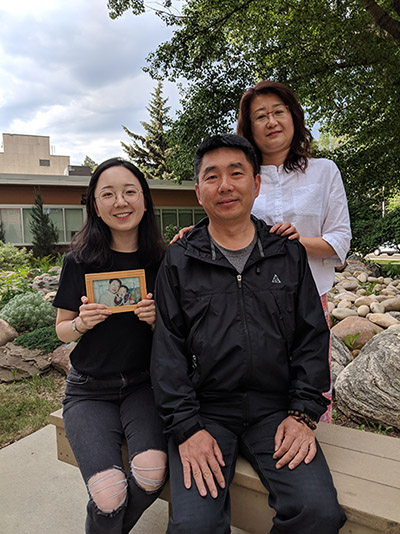
Yiming Li (left), holds a favourite picture of her as a toddler with her maternal grandfather, Zhongsheng Yan. Her father (middle) Chun Li, and mother (standing) Yan Yan, traveled from China to attend their daughter's convocation June 14.
The Chinese philosopher Confucius first introduced the ides of filial piety-the virtue of respect for one's parents, elders and ancestors-in the 4th century BC.
It's a perspective that is still strong in Chinese culture and one that Yiming Li, who graduates with a bachelor of science (human ecology) June 14, intends to make her life's work.
Like Li, who is an international student, is one of 33 international students graduating June 14. Raised in large part by her grandparents in Dalian, China, Li found the Human Ecology undergraduate program through her online research. The major in family ecology, coupled with a minor in aging, spoke volumes to Li.
"China has a large aging population but it hasn't done a lot of work to support aging well," she said. Through her four years of school, Li developed a breadth of knowledge to the Chinese seniors industry, but it was her final practicum that helped coalesce her planning.
The practicum program in the Department of Human Ecology began in 1974. "Back then, just like now, practicums were believed to be an important way for students to apply their skills and knowledge in a real world setting, and to build confidence in the skills they had before they graduated," said Kathryn Chandler, practicum coordinator for the department. "HECOL students hit the ground running as soon as they graduate because they know they've got what it takes to get a job in their field," she said.
"A practicum is especially important for international students because many of them, like Yiming, come to Canada with no work experience. The practicum is their first job experience and therefore a big boost for their resume, and their confidence."
Li worked at the Senior Housing's Community Supports team at the Greater Edmonton Foundation to poll local members of the Chines community on a Quality of Life survey, which looks at perspectives of people transiting into living in Greater Edmonton Foundations Seniors Housing.
The goal of the survey, said Li, is to identify pressure points for seniors that may be an impediment to their happiness in the GEF housing so that programming can be developed from the survey results.
What Li discovered with she completed the survey could have profound results for work engaging seniors at home in Dalian: despite her fluency in Mandarin, which many respondents spoke exclusively, their frustration with language barriers made them reluctant to participate in the survey. So, for Li, her success was measured by the time spent face-to-face with seniors, rather than through the traditional survey methods.
This lesson, as well as the others she has accumulated, will be significant in Li's work with Chinese systems. "When I go back to China I want to develop programs that are focused on seniors housing and integrate what I learned about Canadian culture."